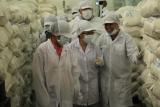Minister of Finance and Vice Minister of Health visited nutrition manufacturing in Railaco

On 13 April 2012, Minister of Finance, Ms. Emilia Pires visited the nutrition manufacturing in Railaco, Ermera district, which is managed by Timor Global Company with support from the World Food Program (WFP). Minister Pires was accompanied by Vice Minister of Health, Ms. Madalena Hanjam.
Vice Minister Madalena Hanjam informed that the program has been established by Ministry of Health in cooperation with TG and WFP since 2007 with an initial budget of $2 M from the Ministry of Health (MoH). MoH is expected to provide another $2 M from its 2012 budget to ensure the sustainability of the project.
Ms Hanjam indicated that this nutrition production is an entry point to further reduce the importation of nutrition products from overseas. It is aimed to provide food products with high quality of nutrition to target groups such as infants of age 6 months-5 years, pregnant mothers and breastfeeding mothers.
To date, the program has covered more than 60% of these target groups. It is expected that once the capacity of the production reaches certain level, for instance 9 tons per day (from 4 tons/day currently), the coverage will expand to other vulnerable groups such as the elderly and the HIV patients, in order for the program to help reduce malnutrition in the country by 15-20% annually.
Minister Pires expressed hope that Timor-Leste will be able to meet its needs and reduce dependency on import of food products or ingredients for production, of which 38% are provided locally and 68% from import. She had recommended to concerned ministries like the Ministry of Agriculture (MAF) and the Ministry of Tourism, Commerce and Industry (MTCI) which have supporting budgets, to strive to increase food production and the nutrition industry to reduce dependency on import, and consequently, reduce the capital out flow from the country.
In an open interaction with members from the media, Minister Pires clarified the question raised by some journalists on why the manufacturing project is managed by a private company like Timor Global instead of a state-owned company, Minister Pires expressed that one of the strategic objectives of development is to strengthen partnership between the government and the private sector. And this can be done by encouraging initiatives of industrialization from the private section in the various sectors of development undertakings.
On the issue of low salary rate ($3,00/day), Minister Pires reminded that the salary rates in the neighboring counties is also low, in particular, Indonesia, where the labor salary rate is even lower than in Timor-Leste. Increasing the salary rate while the country is still weak in terms of productivity and industrialization skills, may prove to be detrimental to the overall effort to attract foreign investment to come and may result in making the country less attractive to foreign investors.
Foreign investment can be viewed as an advantage for the country, in the long-term, because it will somehow pave the way to attract others to join and invest, concluded the Minister.










































